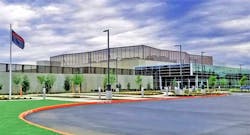7 Ways Your Business Can Benefit From Colocation
As businesses grow, so does their data. This is largely predicated on the continued focus on digital transformation and the Internet of Things (IoT). The latest estimates expect the amount of new data to reach 180 zettabytes (ZB) by 2025—that is up from 44 ZB in 2020. Surging quantities of data inevitably lead to insufficient data center space and strained bandwidth. This can introduce service delays and impact operations.
To safely store, manage and analyze data, businesses need flexible space and connectivity solutions that can meet existing and future needs without compromising security or compliance. Yet, in-house data center solutions may not be able to keep pace with business growth. While building a larger data center is an option, this can be extremely expensive and time intensive. It also requires a level of expertise many businesses may not possess internally.
Colocation offers a flexible alternative that allows businesses to scale their infrastructures as needed. Many businesses recognize this value as a study by Vanson Bourne reported that 79% of large enterprises say their digital strategies are rapidly increasing their need for third-party colocation services. Before building a new data center or expanding an existing onsite facility, businesses should consider the benefits of colocation.
Reason #1: Controlled Costs
Building a data center is expensive. From purchasing land, planning the build and constructing the facility, to installing fiber connectivity and integrating physical security and critical operating systems, the upfront costs alone can be staggering. Even after construction is complete, there are ongoing maintenance and staffing costs. Colocation allows businesses to lease existing space to avoid the time, costs and stress associated with building a facility. This reallocates resources, allowing internal IT teams to focus on revenue-generating initiatives.
An outsourced model also allows businesses to shift their cost structures from capital expenditures (CapEx) to operating expenses (OpEx) to provide a more consistent and predictable monthly payment structure. It also allows businesses to control costs by only paying for the space, power and connectivity they need. Additionally, business can realize economies of scale and gain opportunities to negotiate better deals as they increase their footprints.
Reason #2: Strategic Data Center Locations
Third-party data centers offer strategically located facilities that allow businesses to choose locations that meet their needs, such as deploying a production environment near a corporate headquarters to support low-latency connections and allow data center managers to easily access the facility. A portfolio of geographically diverse national data centers also allows organizations to establish disaster recovery (DR) sites a safe distance from the primary location. Building two data centers to support this DR strategy is extremely expensive and outside of many organizations’ budgets.
Reason #3: Data Center Redundancy and Diverse Connectivity Options
Third-party data centers also offer redundant infrastructure to help promote 100% uptime. This includes multiple UPSs, cooling units, generators, power grids and power feeds. They also offer advanced inerconnection, and access to a variety of carriers and major hyperscale clouds. On-premise data centers generally lack access to this breadth of providers. This resilient environment ensures if one critical element or connectivity path fails, another can take over.
Reason #4: Rapid Scalability
Perfectly sizing an internal data center is extremely difficult. Building it too large leaves businesses paying for unnecessary space, while not building it large enough risks capacity challenges down the road. Partnering with an outsourced provider allows businesses to rent existing space to quickly address capacity requirements without capital outlay. Businesses that do not sustain the growth can easily scale back down. This elasticity extends beyond space and power to allow businesses to quickly expand bandwidth to accommodate traffic spikes that can cause performance issues and outages.
Reason #5: x365 Onsite Expertise
Operating a data center is time-consuming and takes an expertise that is difficult to maintain internally. Businesses that manage the data center themselves also pull valuable IT resources away from core, business-critical IT initiatives. Colocation provides a skilled team of professionals to oversee the facility. This team is available 24x7x365 to address concerns and ensure optimal performance. Data Center migration is a solution that combines the savings of colocation with the flexibility of an outsourced model that also provides the specific expertise businesses need, when they need it, without the expense of hiring a skill set they may not need long term. This on-demand expertise enriches the customer experience and delivers peace of mind.
Reason #6: Data Center Security and Compliance
Protecting data remains a critical business expectation. Colocation offers multi-layered physical security features that are designed to ensure only authorized personnel can access the facility. These features include perimeter fencing, 24×7 guard patrols, visitor screenings, video surveillance, card readers and biometric access controls. Additionally, colocation facilities implement policies and controls to help meet various compliance certifications and standards, including SOC 1, SOC 2, SSAE 18, ISO 27001, HIPAA and PCI DSS.
Reason #7: On-going Innovation
Colocation providers also continually invest in new, innovative technologies that on-premise data centers may not have the resources to implement. These technologies can streamline processes and operations, strengthen overall performance, improve cost efficiency and time management, and drive overall operational value.
Colocation entrusts a business’ data to a data center professional equipped with the right operational environment, security, staffing and protocols. As businesses continue to grow, ensuring the data center environment can support shifting needs is more critical than ever. With colocation, data center environments can scale in lock step with changing needs and deliver the connectivity, security, resiliency and support necessary to succeed in an increasingly fast-paced, digital landscape.
Megan Hofmeyer is Strategic Marketing Director at Quality Technology Services (QTS). QTS is a leading provider of hybrid colocation and mega scale data center solutions.


